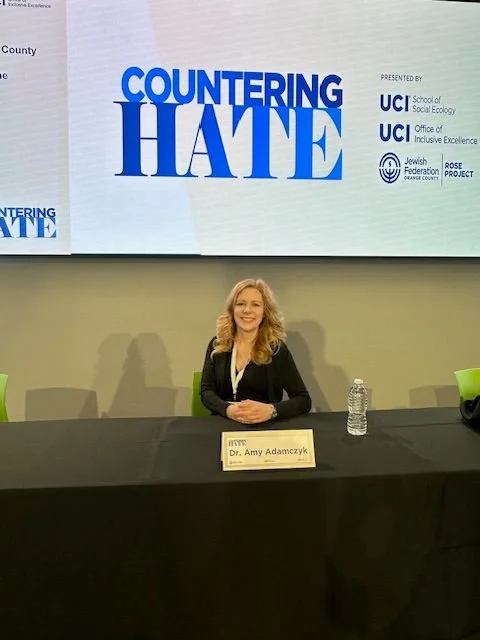
Teaching
Dr. Amy Adamczyk is a Professor of Sociology at John Jay College of Criminal Justice and the Programs of Doctoral Study in Sociology and Criminal Justice at The Graduate Center, City University of New York.
Courses
-

Survey of Research Methods
Graduate Course
This course is an introduction to the methodology of social sciences. Over the course of a year we will explore the five essential components of any research project. We will examine: a) the foundations of the research enterprise; b) how to plan and prepare a study; c) various methods of data collection and analysis; d) how to communicate our findings to others; and e) the ethical considerations involved in research. In our second semester, we will focus on methods of data collection and analysis. I will cover several types of data collection. Finally, we will review the basics of qualitative and quantitative data analysis and the mixed-methods’ design.
-

Survey of Research Methods in Criminal Justice II
Graduate Course
This course is an introduction to the methodology of social sciences. Over the course of a year we will explore the five essential components of any research project. We will examine: a) the foundations of the research enterprise; b) how to plan and prepare a study; c) various methods of data collection and analysis; d) how to communicate our findings to others; and e) the ethical considerations involved in research. In our second semester, we will focus on methods of data collection and analysis. We will cover several types of data collection. Finally, we will review the basics of qualitative data analysis and quantitative research design. Students will get a thorough preparation for taking the comprehensive research methods exam.
-

Internship in International Crime and Justice
Graduate Course
This course aims to connect academic knowledge in the field of international crime and justice with the realities of the field. By participating in a field placement, students should better understand the connections of the local to the global, and their role as professionals in this evolving field of study.
-

Internship for Sociology
Undergraduate Course
Internships provide students with an excellent opportunity to gain academic credit and hands-on work experience. Drawing from the concepts, theories, and methods that they have learned in the classroom, internships give the students a chance to be a participant-observer in a wide range of workplace settings where they can gain invaluable knowledge, skills and experience while exploring future career options, building one’s resume, developing networks, and meeting prospective employers. For students pursuing graduate school, internships help them to choose what interests them. Placement sites include a range of diverse settings. In addition to a total of 96 hours [8-10 hours per week] of workplace related work, students must attend class sessions on campus for 15 hours.
Reccomendation Letter
If you are interested in receiving a letter of recommendation, please fill out the form. Typically, if you earned some version of an A (e.g. A+, A-) in one of my classes, I know something about you, and we have had a good rapport, I would be willing to write a letter of recommendation for you.
If I agree, I will need the following information in addition to anything else that we discuss:
1. An overview of your Grades
2. A curriculum vitae
3. A short statement
This statement should describe what you have learned in my class, and why you think I would be a good person to write a letter of recommendation.
4. If you are applying for graduate school, send the formal statement of purpose that you plan on submitting to the universities to which you are applying. If you are applying for a job, please describe the type of job that you are seeking.
5. Information about where you want me to send the letter(s) and the method of delivery (e.g. regular mail, email, fax, etc.).

